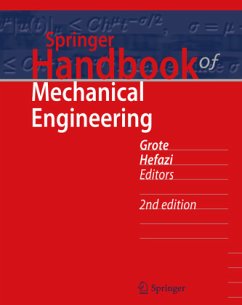Mechanical Engineering is a professional engineering discipline that involves the application of principles of physics for analysis, design, manufacturing and maintenance of mechanical systems. It requires a solid understanding of key concepts including mechanics, kinematics, thermodynamics and energy. Mechanical engineers use these principles and others for example in the design and analysis of automobiles, aircrafts, heating and cooling systems, industrial equipment and machinery. In addition to these main areas, specialized fields are offered at universities to prepare future engineers for their position in industry, such as: mechatronics and robotics, transportation and logistics, fuel technology, automotive engineering, biomechanics, vibration, optics and others. Accordingly, the Springer Handbook of Mechanical Engineering devotes its contents to all areas of interest for the practicing engineer as well as for the student at various levels and educational institutions. Authors from all over the world have contributed with their expertise and support the globally working engineer in finding a solution for today's mechanical engineering problems.
From the reviews:
"This handbook has been conveniently structured into three parts: A. Fundamentals, B. Applications, and C. Complementary Material. ... this handbook a truly unique and indispensable information source, a 'must-have' for any engineer's book shelf. The book is of particular help for materials engineers in showing the cross-links to all important key-topics of mechanical engineering." (Materialprüfung Materials Testing, Vol. 51 (3), 2009)
"This massive volume, edited by Grote ... and Antonsson (Caltech), and including 92 contributors, is the most up-to-date and most representative of the state-of-the-art in many broad areas encompassed by the field of mechanical engineering. The book contains three parts ... . The usefulness of this handbook is hampered by its skimpy index ... it has many attributes that make it an important addition to the reference shelf of any library serving a mechanical engineering department. Summing Up: Highly recommended. Upper-division undergraduate through professional collections." (A. M. Strauss, Choice, Vol. 47 (1), September, 2009)
"This handbook on mechanical engineering provides details on ... fundamental building blocks of mechanical engineering. ... It is broken down into three parts. ... Since quite a wide variety of topics is covered in this handbook, it will give students an idea of what is involved in a number of different areas of mechanical engineering and in some electrical engineering specialties. Those not specializing in mechanical engineering but needing to learn the basics as part of their job will also find it useful." (John S. Shea, IEEE Electrical Insulation Magazine, Vol. 26 (3), May/June, 2010)
"This handbook has been conveniently structured into three parts: A. Fundamentals, B. Applications, and C. Complementary Material. ... this handbook a truly unique and indispensable information source, a 'must-have' for any engineer's book shelf. The book is of particular help for materials engineers in showing the cross-links to all important key-topics of mechanical engineering." (Materialprüfung Materials Testing, Vol. 51 (3), 2009)
"This massive volume, edited by Grote ... and Antonsson (Caltech), and including 92 contributors, is the most up-to-date and most representative of the state-of-the-art in many broad areas encompassed by the field of mechanical engineering. The book contains three parts ... . The usefulness of this handbook is hampered by its skimpy index ... it has many attributes that make it an important addition to the reference shelf of any library serving a mechanical engineering department. Summing Up: Highly recommended. Upper-division undergraduate through professional collections." (A. M. Strauss, Choice, Vol. 47 (1), September, 2009)
"This handbook on mechanical engineering provides details on ... fundamental building blocks of mechanical engineering. ... It is broken down into three parts. ... Since quite a wide variety of topics is covered in this handbook, it will give students an idea of what is involved in a number of different areas of mechanical engineering and in some electrical engineering specialties. Those not specializing in mechanical engineering but needing to learn the basics as part of their job will also find it useful." (John S. Shea, IEEE Electrical Insulation Magazine, Vol. 26 (3), May/June, 2010)

